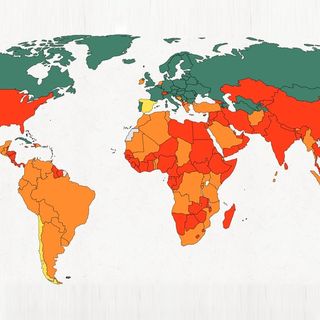
Got A Great Marriage? See A Couples Counselor.
An objective third party can strengthen an already strong marriage.

In April, we published a piece encouraging people to take care of their mental health the way they care for their physical health: through continuous, small efforts, rather than only after something goes wrong. Many psychotherapists advise counseling as a form of prevention, not cure. And if you work on maintaining your mental and physical health on a regular basis, even when you’re healthy, shouldn’t it follow that you can also work on strengthening your marriage even when things are going well?
Marriage counseling definitely does seem like it could fit into a preventative space, but it’s hard to see it that way when the only couples you hear about going to a marriage counselor are at the last straw.
“Couples often associate couples counseling with ‘crisis control,’ and for many couples, a crisis is the only reason that couples ever seek professional help,” says Denise Limongello, a psychotherapist who has special expertise in working with couples. “Couples counseling as preventative maintenance, however, rather than ‘crisis control’ can be of enormous value in maintaining the relationship.”
Couples may shy away from seeing a marriage or couples counselor because it implies there’s something wrong with the relationship. But they could be denying themselves the chance to make their marriage stronger. “What couples should realize is that seeking the help of a professional counselor does not have to be a ‘defeat,’” says Limongello. “Working on strengthening the marriage even when nothing is necessarily wrong can be a great way to make each member of the partnership feel safe and loved and to prevent future mishap.”
Even if everything is going well for a couple, Limongello says that they can still use counseling to help grow and build their marriage. “Couples can use couples counseling as a way to set goals around improved communication and work on building solidarity and teamwork in the marriage rather than assuming the work is always meant to save a marriage from disaster,” she says.
And seeing a counselor could help solve the smaller issues that many couples face that aren’t ‘our marriage is ending.’ According to Limongello, the biggest indicator that a couple could benefit from marriage counseling is if they’re having the same fights, over and over again. “Recurrent fights can indicate an underlying tension or a larger unsolved problem within the relationship,” she says. “Constant bickering, even if mild and seemingly innocuous, can still indicate a need for deeper exploration and problem-solving.”
The very premise of marriage counseling is what couples stand to benefit from: an objective, third-party moderator to help them hash out issues and concerns — big or small. Having a third party in the room can actually make couples communicate more honestly with one another, as well as help them establish ground rules and guidelines around clear communication.
Incidentally, developing such guidelines during marriage counseling could also serve to help couples who are preparing to enter into marriage. Beyond preventing future mishaps, counseling could help couples better understand what they’re getting into. As divorce rates in India rise, more couples are looking to counselors to help mediate their divorce and family court proceedings. A few readers who took our marriage survey said there was no way to be sure what they were entering into, and it was only after they were in the marriage that they figured out what the relationship would be like. “It’s not like you get to try various options before getting married,” one woman told us. Seeing a counselor before getting married to hash out details could potentially temper that problem.
“We simply cannot predict what life will throw at us, which is why it’s more important than ever for couples to establish boundaries and clear communication guidelines,” says Limongello. “Couples counseling can be an extremely beneficial way to facilitate a negotiation of what each person wants out of the marriage.”
Of course, it can be hard to overcome the worry that others will perceive your visit to a marriage counselor as an indication that your marriage is on the down and out. Issues between a couple are often intensely private, and it can be difficult to do something that feels like admitting ‘defeat,’ as Limongello puts it. But society has largely managed to overcome the stigma around regular visits to a therapist — perhaps it’s time for us to shed the stigma around therapy for a marriage, too.
Urvija Banerji is the Features Editor at The Swaddle, and has previously written for Rolling Stone India and Atlas Obscura. When she's not writing, she can be found in her kitchen, painting, cooking, picking fights online, and consuming large amounts of coffee (often concurrently).
Related


India Ranks Low in Global Analysis of Paternity Leave
